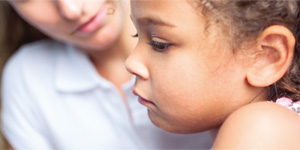Preschool
6 min Read
Preschoolers can handle the truth. Here’s how.

February 17, 2015
Preschool
6 min Read

February 17, 2015


Protecting our children from the dark side of life is one of our most primal instincts.
Sadly, it isn’t realistic to think that your child will never have to be given bad news. But it is possible to be prepared for the task and to follow some basic guidelines to ensure that the way the news is presented doesn’t make a bad situation worse.
Chrissie Keddle, a mother of two young daughters, recalls the day that one of her daughter’s preschool playmates passed away from a congenital lung disease. “It was very sudden. My daughter, Haley, wasn’t quite four years old at the time. I knew that it was going to be hard to explain why her friend wouldn’t be back at the preschool.” But Chrissie never considered the strategy of not telling her daughter the truth.
“We sat down and explained that her friend wouldn’t be back to preschool, because she wasn’t with us anymore,” said Chrissie. “Haley really didn’t understand the concept of death at the time, but she did understand that her friend was gone, and was very sad at the loss.”
Dr. Alanaise Goodwill, a psychologist and educator with three children of her own, agrees with Chrissie’s approach. “Never lie to a child,” says Dr. Goodwill. “Their cognitive abilities may not be such that they understand the concepts at work, but they can recognize lies through our tone, body language and even biochemical markers. Lie and you will lose their trust. And that’s something that you may not be able to recover.” Instead, she explains, it’s important to construct a narrative that makes sense to your child at their age and stage of development.
Dr. Goodwill says it’s important to recognize your child’s needs at the time, the most important of which is to make them feel safe in the face of traumatic news.
“The concept applies whether you’re talking about death, the separation or divorce of their parents, relocation to another home far away from their friends … these are all stressors and they can shake the foundation of the child’s life.”
Dr. Goodwill points to the work done at McGill University to explain the roots of stress. “The unfortunate acronym they used was N.U.T.S.,” says Dr. Goodwill. “It stands for the major factors that cause stress. ‘N’ stands for the new experience, one for which the child is not prepared. ‘U’ stands for the unpredictability of the situation and the fear that life’s stability has been lost. ‘T’ is the threat to the ego…will I die too? ….does this mean daddy doesn’t love me? It’s all about how they are affected.” ‘S’ stands for the sense of control that is lost when bad things happen.
Dr. Karianne Axford, a psychologist whose B.C. practice deals with many children in crisis, agrees that all these factors are at play with children under stress. “There’s no perfect answer to the question of how to break bad news, but recognize that children do not have an adult’s ability to think abstractly or in the long term. What they are concerned with is whether they are themselves loved and safe. They also need to be assured that they have value, particularly in the case of family breakup. In the case of any bad news, they have to know it’s not their fault.”
Dr. Axford said that this is the prime reason for telling children the truth about a bad situation. “It gives you the opportunity to explain that they are not to blame,” she says.”In the absence of an explanation, children will fill in the gaps for themselves, often finding ways to take the blame for what has happened and then feeling angry and frustrated when they can’t find a way to fix the situation.”
The other aspect of bad news for which parents need to prepare is to periodically revisit their child’s questions. “As they mature,” says Dr. Axford, “their cognitive abilities develop. They may return years later with questions that were not answered at the time of the original trauma.” Dr. Axford says it’s important to always take the time to review the events and to fill in the gaps that may have been left by your original explanation.
“The worst thing we can do is to refuse to ‘open old wounds’, because again, you’ll leave your child to fill in the gaps themselves. They may come up with an entirely mistaken interpretation of events.”
Originally published in ParentsCanada magazine, Feb/Mar 2015.